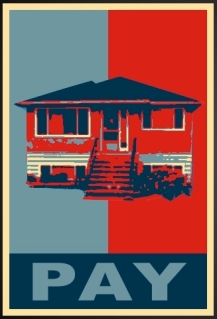Brendon J. Wilson at VREAA 24 May 2011 10:33am –
“I returned to Vancouver from living and working in Silicon Valley for four years (I left after my MBA because Vancouver opportunities were lacking at the time). My wife and came back to start a family, and because we had grown tired of the Valley.
I interviewed at one company for a Chief Technology Officer position. When we got around to salary discussions, the employer indicated they would be willing to go as high as 90K. I pointed out that this was the salary I earned ten years ago.
“Oh you can’t compare a Vancouver salary to what you would get in Silicon Valley!”
“I’m not. That’s what I was paid ten years ago…in Vancouver.”
<awkward silence>
Ten years of additional experience, an additional advanced degree, plus international experience in the hotbed of technology in a significant role at a successful startup = no incremental value to a Vancouver firm.
Needless to say, I now work for a firm in Silicon Valley, remote from Vancouver, at close to twice the salary they offered. For those of you wondering – the cost of living in Vancouver is about the same as living in California.
What is wrong with this picture?”
[When you add in considerations such as taxation and cost of accommodation, does California end up being cheaper? – vreaa]

































No, California is still pretty much the same. Normally, having moved / lived in a few different countries, the cost of living is overall usually the same in relation to the income you make, with some minor varieties.
Living in the Valley is not cheap, on a previous contract I was flying down there quite a bit and although things like booze is cheaper there and many times you can find dirt cheap food (with the associated quality) in other areas they nickle and dime you to death.
Overall the cost of living is the same between SF and Vancouver, only difference is, as your poster pointed out, that you can make easily twice the money in the Valley.
except wine & cheese are cheaper in california. 🙂
Seriously, though, my partner and I calculate about a 30% increase in goods living in Canada vs. the states.
Not just on things like wine due because of taxes, but random items are more expensive pre-tax: manilla folders, books, bookcases, cars, paper towels, cereal, moisturizer, airfare (internal to the US), .
In terms of food – any sort of dairy is more expensive and so is chicken. Of course wine/alcohol is more expensive, but that’s due to taxes.
We estimate 20K/ per year more to live in Canada to maintain the same standard of living. This difference includes co-pays for health care in the US. We’re fairly young and not ill, though. (This 20K doesn’t including housing — standard of living in terms of housing is much more problematic, as this blog documents.)
Then why does your family want to be in Vancouver when it doesn’t make sense to live here because of high housing prices and low wages? There must be a reason!
the weather is fantastic!
and the people.. there’s such unity and commonality of purpose amongst us – it really is the best place on earth!
“There must be a reason!”
And what do you think this means: “the cost of living in Vancouver is about the same as living in California”?
I don’t envy his position. In fact, most of the non-owners are in the same boat – need to accept less pay for the priveledge of living in Vancouver, and also need to pay much more for housing. This city does have a way of separating the wheat from the chaff.
God, you’re delusional…
And a big giant score of zero on the “reading comprehension” section of the test.
“..need to accept less pay for the priveledge (sic) of living in Vancouver, and also need to pay much more for housing”
And I am Shah of Iran and you are Cleopatra..more LSD anyone??
we need a thumbs up emoticon – wearing a large white cartoon glove
lol, would you just f**k off already.
I just ran into a guy on a Westjet flight a while ago who works in Calgary Monday to Thursday and lives in Delta. He says he’s making about 35% more, plus it’s a job he loves. He can afford to pay for the airfare and still makes more money and has a job he’s trained for. He says there are few jobs in his field in Vancouver.
im going to calgary for the stampede. check out the city for a possible move.
never thought of flying back and forth , i guess it wouldnt be too bad…
And read Brendon’s follow-up comment as well. The city is becoming pied-a-terre not only for “rich Asians” but also for those with North American employment. Remember these people will spend larger amount of time away from the City, meaning they spend less with local companies. This literally “guts” the City because business revenue and taxes will drop.
Nobody is questioning that Vancouver is considered a desirable place to live but why is it the case that low salaries is the result — low salaries are a symptom of the addiction to real estate.
I am one of those people who live in Vancouver but make my money outside of Vancouver.
There are a few other factors that need to be taken into consideration in this comparison between Vancouver and CA. The big one is property taxes, which are at least twice (or 3 X) as high as Vancouver. And unlike Vancouver, property taxes in most cities in the Bay Area do not include garbage, water or schools. All these things are ‘extra’. The scarcity of good public schools is also a huge factor for families. Thanks to Prop. 13 – which was a bad idea decades ago – the public school system in CA. has been eviscerated. Then there’s health care, which is a minimum of $1,200 a month for the basic tier (eg: Kaiser) of a family HMO. In sum, while the price of housing looks pretty good and food and wine is much less expensive in California, the quality of life which is taken for granted in Vancouver is pretty costly in California. And then there’s the matter of all all those guns.
Having noted this, I agree with Jesse that Vancouver’s addiction to gambling and real estate (or ‘ficto-finance’ ) has gutted this town of its ability to produce and create and maintain revenue. Many many homes now sit empty, as “holding’ properties, housing no one, going no where, sinking fast. There is nothing quite so sad or souless as a tourist town which tries to be everything to anybody and winds up being nothing, and this unfortunately is what Vancouver is fast becoming.
Health care premiums can be expensive in California (much worse then other states), although it depends very much on the health care one gets through the job.
Schools are a problem in many California neighborhoods, although I don’t know to what extent they are a problem in upper-middle class communities like Marin county. Earning 180K a year, though, means the family in the above excerpt can choose to send children to private schools.
Have to agree with “interested”. Despite the higher wages and perhaps lower cost of living in the Silicon Valley, I’d still choose Vancouver for the better public school system and better access to health care. Getting sick in the States probably degates a lot of people’s saving potential. But when you are a CTO and those costs are covered, does it matter? What about the rest of us?
The medical care standard for professionals is equal to or greater than Canada’s system. If an employer is attempting to hire top-quality people they won’t skimp on a comprehensive health plan. Often a company will offer several providers and levels of coverage and charge employees higher premiums.
Another point is that a looser safety net in the US is reason in itself for salaries to be higher. Just as an investment with large downside risks trades at a premium, so too would employers need to pay more to compensate those who are taking these risks. It’s the old “reverse lottery” problem again: 99% of people will do very well while 1% will suffer misfortune and suffer financially (including the expensive prospect of covering insurance in the event of job loss or some chronic illness that isn’t fully covered under their insurance plan).
When you see the disastrous results of living without comprehensive insurance, it’s worth pondering that Americans have a large incentive to start working again, and quickly.
If disaster struck and this guy lost his job and his health care in California, wouldn’t he be covered by health care if he went home to Canada?
If he was originally from BC, and took a job in California, would he have to get a job again in BC to get covered by the state health plan?
So, I work in tech. Two things:
A decade ago, the tech boom was on. Good people were easily making money hand over fist, and that was before factoring stock options (worth a lot of money if you cashed out at the right time). $90k wasn’t that much. (I was still in school, have heard all the stories.)
I’m having trouble imagining wanting to hire a CTO for $90k. My position is considerably more junior than CTO, assuming they would make at least twice as much as me, and I make more than $45k.
Yank, re Canada healthcare, when someone takes up residence in BC, provincial healthcare starts after 3 month waiting period, no job required,enrollment mandatory for all, premiums about $60/month for single, $121 for family of 3 or more.
To add my 10 cents: we returned from Hong Kong as expatriates 3 years ago, I guess we thought we were suffering from burn out after 8 years and felt it was time to settle down. We rented a property in West Vancouver and my husband, a financial anaylst eventually landed a job after 2 years. Working for a small Canadian firm was pretty dull and after tax it was pretty much impossible to make ends meet. Our idea of living in a community where you knew your neighbours and the kids played on the cul-de-sac until dark never materialized as we saw houses being bought and sold and often left empty. House flipping here really is a sport and it certainly doesn’t build ties to the community. The only friends we have made on our street, ironically, are another expatriate family who were acquaintances from Hong Kong. Go figure.
We were certainly looking for the lifestyle of the skiing and the fresh air, but that all becomes a little stale once you have fought for parking at Grouse or are gouged doing ANYTHING in Whistler all while avoiding kamikaze stoned boarders who do not care if they obliterate an entire family. It’s all a bit overrated. The amount of time one spends in traffic here is ridiculous: I can’t understand the logic – we won’t cut down a single tree to expand a road to manage traffic but we will let everyone idle in our cars while merging from four lanes to one on the Lion’s Gate, all while we pump gas fumes into the air. And our government wants to encourage more migration to Vancouver when the citizens we have here can’t get anywhere. Nuts.
Consequently a new position in an international bank in Hong Kong came up, starting tomorrow, pays more than double the Vancouver salary. Thank god we did not buy a property here, because I am not convinced we would have sold it and broken even. While rents in Hong Kong are definately higher, Hong Kong tax allows you to deduct 50% of your annual rent off your gross income before you calculate your 15%. And the government is so efficient that when they run a surplus (which happened at least twice while I lived there), they give every citizen and permanent resident a tax rebate. Yes, folks this is true. This year, we both got a cheque for the equivalent of $800 Cdn courtesy of the government of Hong Kong. When they ran a deficit as they did during SARS, all government employees took a 5% salary cut. Your employer pays your health care costs unlike here, where the employer deducts extended health off your income. If we need to see a specialist, I can see one the very next day. Health care is excellent and yes, you can find an excellent doctor who will take you on as a patient and give you 45 minutes if you need it. Our daughter had pioneering kidney surgery in Hong Kong 3 years ago that is still not offered anywhere in Canada.
Believe it or not general day to day living expenses (other than rent) are not more expensive than here, transit is excellent, cheap, clean and safe thereby eliminating the need for a car entirely. Hong Kong is an international airport with direct flights to numerous destinations all over the world. How hard is it to leave Vancouver and get to a sunny destination without taking multiples flights that cost an exhorbitant amount? With a decent salary and low taxes, when I get fed up with the pollution, I can be on a deserted beach in 4 hours in a 5 star resort for a 1/3 of the cost of a trip to Hawaii .
As a born Vancouverite, I wanted my daughter to finish school here and make friends. Now I realize that there is no future for her here once she finishes university and she certainly will never own a property here. Will we come back ever? Yes to visit the extended family. But, we’ll never live here again, even when we retire. There are plenty of other sunny, less expensive destinations to choose from. Vancouver is a nice place to visit but living here is just not all its cracked up to be.
@ Michael, cost of living and income do not always go hand in hand, Having lived 5 cities in 2 countries I can attest to that
Pingback: Vancouverite On Vancouver – ‘Neighbourless Neighbourhoods’, ‘Ficto-Finance’, ‘Soulless Tourist Town’ | Vancouver Real Estate Anecdote Archive
Pingback: The Rat Race: living in Vancouver and yes you can wear white after Labor Day!!! | Vodka Infused Lemonade
For those of you tuning into this post, a small update: As of February of 2012, my family and I relocated back to Silicon Valley. Tough choice, but the evidence of a massive impending housing crash in Vancouver was simply too obvious to ignore. I wasn’t interested in being around to observe the fallout. I love Vancouver as a city, but economically, it’s a train wreck.
New job, great salary, and moved into a 3-bedroom house that I’m renting for only slightly more than our two-bedroom apartment in Vancouver.
This is what Vancouver (and frankly Canada, or any advanced country) needs to recognize: your most valuable citizens are not prisoners – they have options.
For us: we’re young, we have high-tech degrees and work experience that is in demand, we’re mobile (even with a kid), and we each have multiple citizenships (Canada, Australia, US, Ireland). If an area can’t get its act together, then we need to move on to someplace where there’s more opportunity.
So pay attention, I say to these countries, because the lifeblood of a healthy economy is slipping through your fingers.